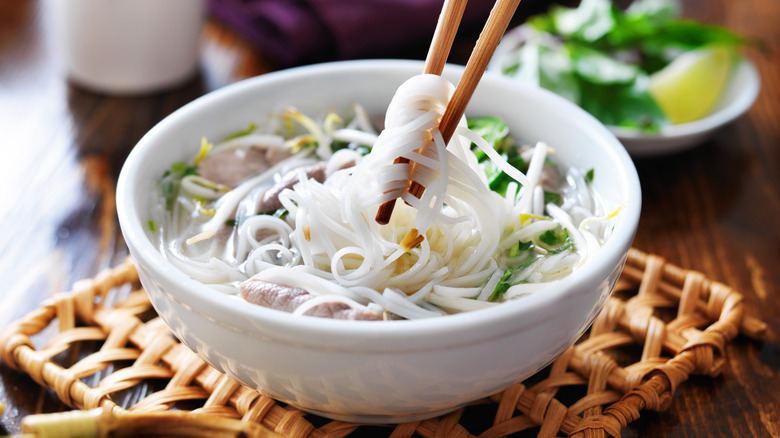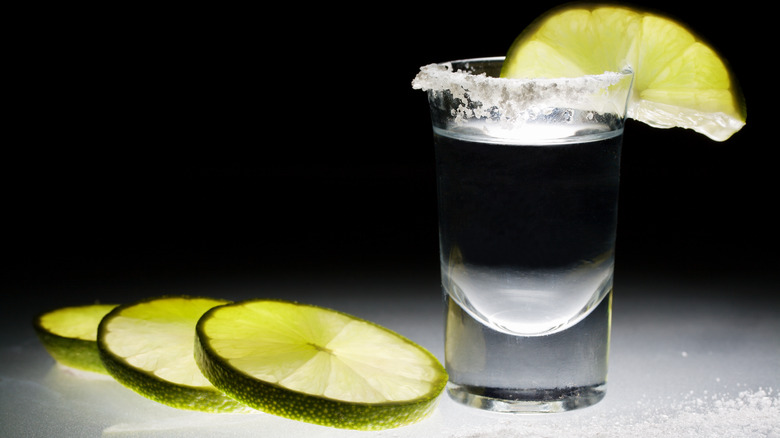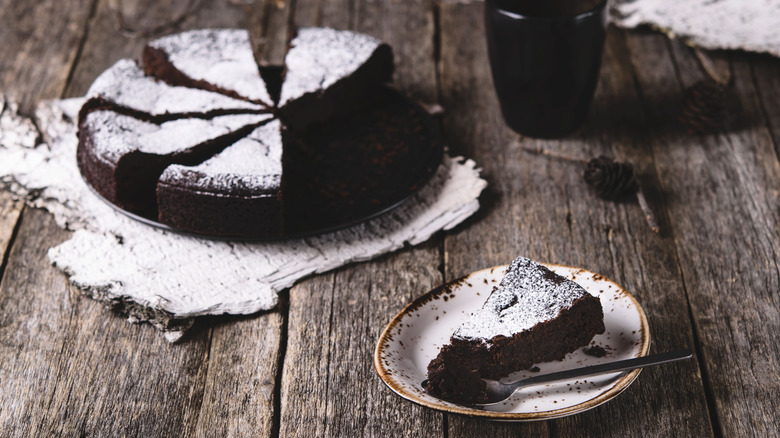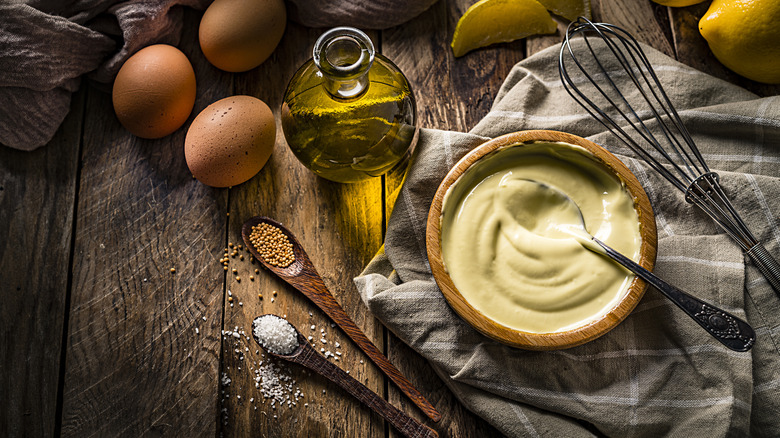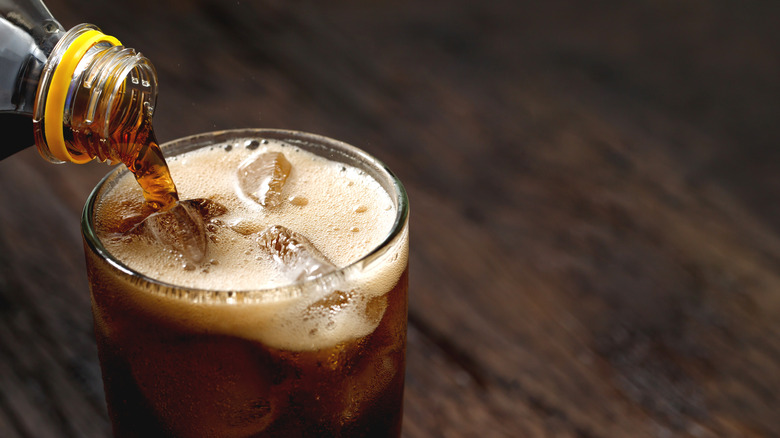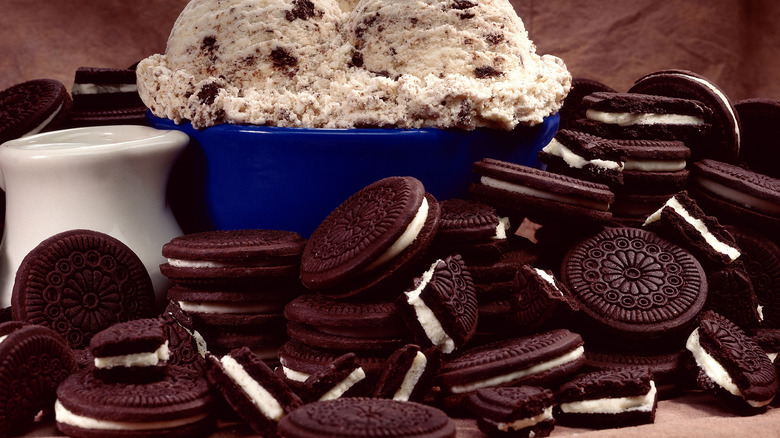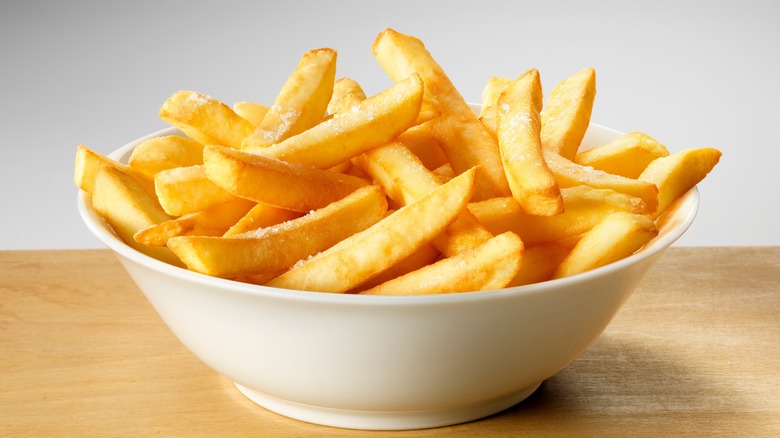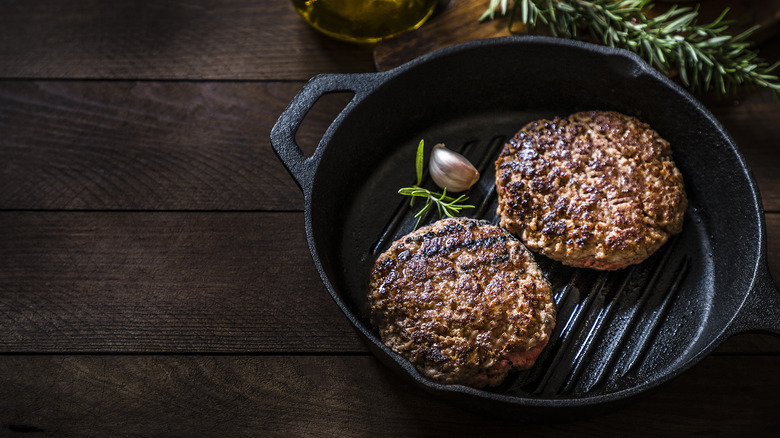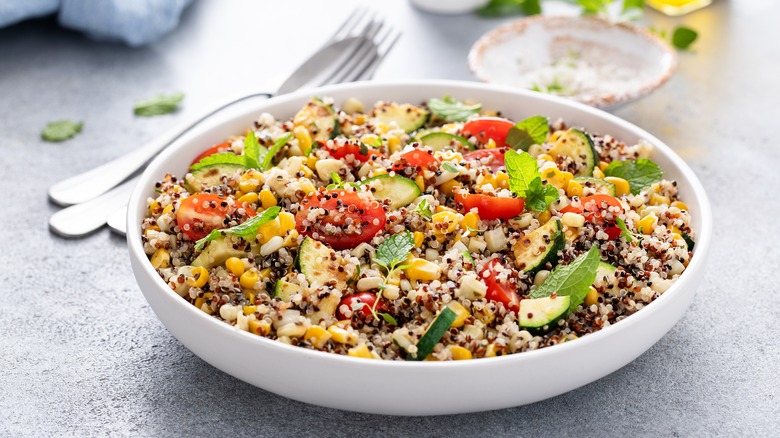13 Foods You Didn't Know Were Kosher For Passover
We may receive a commission on purchases made from links.
Food is an important part of the Passover (or Pesach) festival, from the Seder meal to the rules against consuming leavened bread or grains during the Passover period. While some Jewish people eat kosher all year round, others go kosher for Passover, which takes place in Nissan — the first month of spring in the Jewish calendar — and lasts for eight days, or seven days in Israel. Standard kosher food rules include only eating meat from certain herbivores, like cows and sheep, avoiding shellfish, not combining meat and dairy products, and avoiding foods that have come into contact with non-kosher ingredients during manufacture.
Throughout Passover, additional food rules apply, such as avoiding leavened or risen wheat and grain products, including bread, cakes, oatmeal, or cookies. Instead, it is traditional to consume matzah or matzo — unleavened flatbread — during Passover and at the Seder meals. This tradition commemorates the story of Exodus and the Jew's escape from slavery in Egypt when they were forced to flee so quickly that they did not have time to let their bread rise.
While an important part of the Pesach tradition, going kosher can make meal planning and snacking a challenge, especially if you're used to including a lot of gluten in your diet. So, whether you're running low on meal ideas or want a mid-week treat, these 13 foods will help you go kosher for Passover.
1. Rice and rice noodles
While some members of the Jewish community avoid rice at Passover due to its similarity to grain, rice is considered kosher for Passover by Sephardic Jews or Jewish people of Mediterranean, Middle Eastern, and North African descent. Rice comes under the category of kitniyot or legumes, which include beans, peas, lentils, and several kinds of seeds. Rice dishes are an excellent gluten-free alternative if you want a change from potatoes and can form the basis of many kosher meals. A bean and vegetable chili is a quick and easy midweek meal, while a rice biriyani is one of the best rice-based Indian dishes that you should try if you like spicy food.
Rice noodles can also be used to vary Passover classics. Made from a mix of rice flour and water, rice noodles are kosher for Passover and can be added to traditional Pesach favorites like chicken broth or served alongside fish. Rice noodles are also great for throwing together a quick stir-fry or can be an alternative to spaghetti. If you are hankering for an egg noodle alternative, you can find Gefen Noodles labeled kosher for Passover.
2. Tequila
While kosher wine is an important part of Passover and celebrating the Seder meal, other types of alcohol become prohibited during Passover. This can be tricky to navigate if you're not a wine drinker or you're hosting Passover gatherings and want to offer your guests a variety of drinks. While alcohols like beer — made from grain — or wheat-based vodkas are off the table, you may be surprised how many non-wheat liquors are suitable for Passover.
One popular option for a Passover tipple is tequila. Hailing from Mexico, tequila is made from blue agave and does not contain wheat products. While reposado and añejo tequilas are aged in wooden barrels — something which is not allowed according to Passover rules as all liquors must be aged in kosher casks – silver or white tequilas are unaged and usually distilled in stainless steel or copper containers.
Brands like Patron Silver are specifically labeled kosher for Passover. However, you can also find other tequila brands perfect for mixing in cocktails and that meet kosher requirements. Classic tequila cocktails include margaritas, tequila sunrise, and Long Island iced teas.
3. Flourless chocolate cake
Passover restrictions on gluten put most cakes and many sweet treats off the menu, however, flourless, gluten-free chocolate cake can be an excellent dessert option. While many cakes involve leavening flour — adding moisture and allowing the mix to rise during the baking process — flourless chocolate cakes leave out the flour, meaning the final product is unleavened. Flourless chocolate cake has a dense, fudgy texture, giving it a deliciously decadent feel that's perfect for finishing a Passover celebration.
You can make flourless chocolate cake at home using cocoa, sugar, chocolate with a high cocoa ratio, eggs, vanilla extract, and margarine. Because it is not kosher to serve meat and dairy together in the same meal, you should only use butter in your cake if you are serving a vegetarian main. You can substitute margarine or butter for kosher vegetable oils like olive oil. This luxuriously sticky chocolate cake takes around 35-40 minutes to bake in the oven and can be topped with chocolate ganache or served with coconut cream and fresh berries if you're going dairy-free.
4. Mayonnaise
Mayonnaise is naturally kosher and is generally made from eggs, vegetable oils, vinegar, and lemon juice. This creamy condiment contains no wheat products, so it's also kosher during Passover when grains are avoided, and is dairy-free, meaning that you can serve it alongside meat. Well-known brands, such as Hellmann's and Heinz, sell mayonnaise that is kosher-certified. You can also find Gefen Lite mayonnaise which is specifically kosher for Passover.
Mayonnaise is also quite simple to make at home, which is a good option if you want to ensure absolutely no crossover between kosher and non-kosher foods. You can make homemade mayonnaise by blending a raw egg with lemon juice and vinegar and then gradually mixing in oil until you get the consistency you want. Flavor your mayonnaise with herbs or garlic for a fresh, zingy taste, and enjoy it alongside a crunchy salad or with hard-boiled eggs. If you're wondering how long mayo is good for, fresh homemade mayo will usually last around 3-4 days in the fridge while storebought mayo has a shelf life of around two months.
5. Popcorn
Good news for movie lovers — if you eat kitniyot during Passover, you can keep your popcorn throughout the festival. Popcorn is a great light snack and is surprisingly low in calories compared to crunchy treats like potato chips or peanuts. A 100-gram portion of air-popped popcorn with no added toppings has around 387 calories and is surprisingly high in nutrients, like iron and magnesium. Microwaved popcorn tends to be higher in calories and often contains trans fats from additives and flavorings.
However, kosher pre-packaged and microwave popcorn exists so feel free to indulge if you have the craving. You can also find flavored popcorn with kosher certification from artisanal suppliers.
Making popcorn from raw kernels at home is one of the easiest ways to ensure that your popcorn is kosher for Passover and that your food doesn't come into contact with non-kosher surfaces. Plus, popping your homemade popcorn gives you control over how much salt, sugar, or butter you want to add, and which oil you heat it with. To pop corn at home, you'll need a large, shallow pan with a transparent lid, to see when most of the kernels have expanded. Use fresh kernels and line your pan with oil, not butter, to avoid some of the biggest mistakes people make when popping popcorn.
6. Coca-Cola
Coca-Cola is generally safe for kosher Jews to consume, however, this becomes a little more complicated during Passover because of one key ingredient — high fructose corn syrup. While Jews who eat kitniyot consider corn kosher at Passover, for others the inclusion of corn syrup can mean that Coca-Cola is off-limits throughout Passover week. If the thought of going without this refreshing beverage for eight days leaves you stressed, don't worry. Coca-Cola has introduced a kosher for Passover line that replaces corn syrup with a sucrose-based substitute.
Making Coca-Cola with sucrose is a return to the brand's original recipe, which used to include cane sugar or sugar from beets. During the run-up to Passover, Jewish shoppers can look out for Coca-Cola bottles with yellow caps, which signify that this bottle contains the kosher for Passover recipe. Unsurprisingly, this product is pretty popular and tends to fly off the shelves, so stock up in advance. Although Diet Coke is also kosher year-round, some Jewish people avoid drinking it at Passover as its aspartame sweeteners may contain corn byproducts or come into contact with corn syrup.
7. Rum and Brandy
Passover is a time for celebration and there are often many festivities and family gatherings to attend. Kosher brandy is a popular spirit option when it comes to enjoying a Pesach nightcap or a brunch cocktail. Brandy is made from distilled wine — usually made with grapes or other fruits, like plums or figs – and contains no wheat or grain, meaning that any kosher brandy will be suitable for Passover. If you're looking for kosher cocktail ideas, a brandy Sidecar — made with Cointreau and lemon juice – is a lip-smackingly tart and juicy option.
Rum is also kosher most of the year and can be kosher for Passover if made under the right conditions. Many kinds of dark rum are aged in wooden barrels, which are not considered kosher if they've housed grain-based spirits, like bourbon. However, rum is made from distilled sugar cane and molasses and does not contain any grain or wheat ingredients.
Pour yourself a Cuba libre — rum, coke, and lime — or enjoy a rum hot chocolate as the ultimate cozy Passover treat. As rum and chocolate are a pairing that's meant to be, you could also create a sticky rum ganache to glaze your Pesach flourless chocolate cake.
8. Oreos
Oreos are a fantastic dairy-free snack and have long been a popular cookie choice for vegans. Awarded their official kosher status in 1997, Oreos are also a year-round go-to for many kosher Jews and have a huge range of different cookie flavors and products on offer. Despite this, Oreos at Passover can be a little controversial for two reasons — one is that they contain corn syrup and the other is that they do contain some flour. However, if you buy gluten-free Oreos, these are usually made with rice flour instead and only contain a small amount of oat flour.
If you want to be really strict during Pesach, you can find Oreo-type cookies from brands specializing in kosher for Passover products. As well as original Oreo cookies, which are famously enjoyed with a glass of cold milk, you can also find kosher peanut butter Oreos and Oreo sandwich cookies.
9. French fries
Craving something salty and fatty the day after Seder? Potatoes are kosher throughout Passover and french fries are a perfectly acceptable snack, so long as they are fried in a suitably grain-free oil. Some fries from fast food restaurants are fried in oils that contain wheat or grain products or have wheat-based seasonings added. Other fast food joints, such as the burger chain Five Guys, serve gluten-free fries that are cooked in peanut oil, meaning that they are kosher for Pesach.
You can also find kosher brands of oven fries or make french fries at home. The best way to do this is to slice and rinse the potatoes before cooking. For the crispiest french fries, blanch your potatoes in oil or boiling water for 5 minutes, then shallow fry them in a pan with oil.
Blanching gives your french fries an amazingly crisp, golden exterior without losing the fluffy texture on the inside. You can also double-fry your fries to add some extra crunch. Serve with kosher mayonnaise for perfect Passover comfort food.
10. Bun-free burgers
Beef is not out of bounds during Passover so you can still enjoy a juicy burger patty, albeit without the bun. If you're buying store-bought burgers, you can find kosher patties at specialty butchers and delicatessens. Some varieties of kosher frozen beef burgers are also available. For those avoiding wheat during Passover, make sure any burgers you buy do not contain breadcrumbs, as they are sometimes used to bulk out patties.
You can also make beef burgers at home using high-quality ground beef. Use an egg as a binding agent to help the patties hold together and season with diced onion for some crunch and freshness. Fry the patties in a vegetable oil of your choice and enjoy without the bun and with a side of fries dipped in Heinz's kosher ketchup. While you won't be able to make your patty into a cheeseburger over Pesach (or if you observe kosher rules throughout the year), a dollop of kosher mayo is a great compromise.
11. Gin
Zingy, slightly bitter, and unbeatably refreshing — a chilled gin and tonic is the perfect springtime drink and a great option to serve at Passover celebrations. Many common gin varieties, including popular brands like Tanquerey, Hendricks, and Beefeater, are considered kosher throughout most of the Jewish calendar. Gin is made using distilled grain alcohol and infused with juniper berries and various botanicals, which give gin its fragrant, herby character. This production method can make finding a grain-free kosher for Passover gin a bit of a challenge.
Fortunately for G and T lovers, the innovative, California-based spirits company Distillery 209 makes a kosher for Passover gin that substitutes grain alcohol for a sugar cane spirit base which is similar to a rum base. Serve a liberal measure over ice with plenty of lemon and a splash of Fever Tree tonic water, which is also kosher. You could also turn your gin into a Tom Collins, giving a classic twist to cocktail night. Mix gin, sugar syrup, lemon juice, and soda water in a highball and enjoy over ice.
12. Quinoa
Similar to popcorn and rice, quinoa is sometimes considered kitniyot and can be controversial for some Jewish people. However, if you don't rule kitniyot at Passover, quinoa can be a delicious starchy option when you're fed up with potatoes. Quinoa is made up of the seeds from a South American goosefoot plant, which is native to the Andes. It is not technically a grain and, therefore, does not violate any of the Passover rules about avoiding leavening agents.
Quinoa is often consumed as a health food because of its plant-based, gluten-free, and low-calorie makeup. It contains high amounts of vital nutrients, such as manganese, magnesium, iron, and vitamin B6, among others. Quinoa is also super quick and simple to prepare and takes around 15 minutes to boil in water. When cooked right, quinoa has a light, fluffy texture, which is neither dry nor gloopy and can easily stand in for rice alongside fish or meat.
Quinoa tastes great when loaded with chopped vegetables, toasted nuts and seeds, fresh herbs, and even dried fruits, like apricots and raisins. You can add it to salads to increase the nutrient density and give your meal some bulk, or stuff bell peppers with it and sprinkle them with cheese. It works well in chicken broths or vegetable soups and is a barley substitute.
13. Macaroons
Few Passover desserts are as iconic as the humble coconut macaroon. These tasty treats are perfect for Pesach because they are made with all kosher ingredients and are easy to whip up at home. Macaroons are also dairy-free, so you can enjoy them for dessert after a meat main course. In the run-up to Passover, you'll find macaroons on the shelves in Jewish stores and in the kosher sections of grocery stores, as well as in artisanal bakeries and delicatessens.
A variety of kosher macaroons are also available to buy online. However, if you want to make your macaroons at home, the recipe could not be simpler. All you need are egg whites, sugar, grated coconut, and a dash of vanilla extract.
Beat your egg whites until they are foamy and aerated and then mix in your other ingredients and bake in the oven for around 20 minutes at 325 degrees Fahrenheit. Make sure to line your trays with baking paper so the macaroons don't stick and use melted chocolate or tangy fruit compote as a tasty garnish.

